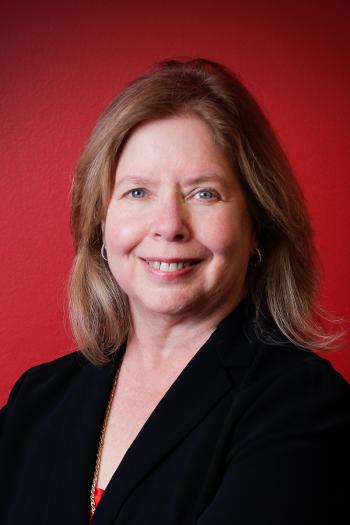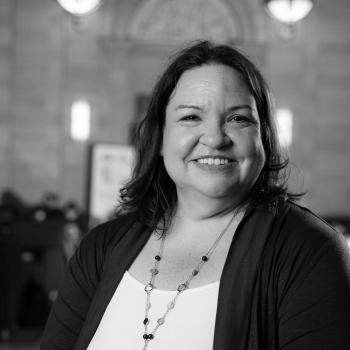About
Welcome to the award-winning University of Minnesota Libraries, one of the University’s and the state’s greatest intellectual assets.
A message from the Dean

Welcome to the University of Minnesota Libraries. Our librarians and staff provide resources, expertise, and support for University students, faculty, and researchers, as well as the wider community.
We promote student success in a variety of ways and spaces. Our data demonstrates that students who use the Libraries tend to boost their GPAs and increase their chances of graduating within four years. Our Minitex arm embraces libraries through Minnesota and the Dakotas and offers the Minnesota Digital Library.
We support faculty and graduate student researchers by facilitating open scholarship, by training on data management, by partnering on systematic reviews — and teaching other librarians these skills — and much more.
Our outreach to the community includes the Mapping Prejudice Project, which documents the history of structural racism through racial covenants. It also includes the Umbra Search: African American History; The Tretter Transgender Oral History Project; and the work of our Friends of the University Libraries.
Connect with us; we are ready to help you with what you need in learning, teaching, and research.
Sincerely,
Lisa German
University Librarian and Dean of Libraries
McKnight Presidential Professor
Facts and figures
Loans
1st
loans to other research libraries
Locations
12
Research questions
18,000+
annual research questions answered
Volumes
7.7 million
total volumes
Serials
112,309
total serial subscriptions
Visitors
805,755
annual visitors
Web visits
1.1 million
2022 web visits
Workshops
762
annual workshops/classes delivered
How we operate
Strategic planning
The University of Minnesota Libraries expands access to information, strengthens research and teaching, and enriches communities throughout Minnesota, the region, and the world.
Our approach to inclusion
Inclusion, diversity, equity, and accessibility are the guiding principles for every aspect of work in the University Libraries. As individuals, and as a whole, we commit to actions that reject racism and advance social justice.
About our collections
Through effective planning and resource allocation, the Libraries develops strategies and policies to ensure it acts as an excellent steward of the University’s resources.
Towards open access
The University of Minnesota Libraries works to achieve an open and diverse scholarly publishing system that enables the University’s research to be freely available as a public good.
Partnerships, projects, and grants
Libraries staff
Search Libraries staff
Administration

Lisa German
University Librarian and Dean of Libraries

Erinn Aspinall
Director, Health Sciences Libraries

Heather Beaton
Director of Development

Jennie Burroughs
Senior Program Advisor and Researcher

Mark Engebretson
Director of Advancement

Jody Gray
Associate University Librarian for Research

Shaan Hamilton
Director of Finance and Facilities

Jessica McCann
Director of Human Resources

Cody Hanson
Director of Information Technology

Patricia Izek
Director of Diversity, Equity, Inclusion and Accessibility

Evangela Q. Oates, Ph.D.
Associate University Librarian for Student Success

L. Angie Ohler
Associate University Librarian for Collections and Content Strategy

Maggie Snow
Director, Minitex

Brian R. Woods
Administrative Associate to the Associate University Librarians

Bill Pederson
Administrative Associate to the University Librarian
Job opportunities
Student Advisory Board
The University of Minnesota Libraries Student Advisory Board is the undergraduate student leadership team of the Libraries. Board members represent the student body and share feedback on library spaces, collections, and services. Board members also work with librarians and library staff on student engagement and outreach projects.
Friends of the Libraries
The Friends of the Libraries play a special role in connecting the University Libraries to the greater community and enriching the campus and community through thought-provoking, entertaining, and intellectually engaging programs.
Policies
Food and drink policy
The University Libraries policies allow library users to have limited access to food and drink.
Entitlements for accessing licensed resources
Electronic resources available through the Libraries are shared according to their licenses (i.e., contractual, legal agreements).
Acceptable use of computing and technology resources
This policy contains details around access, user conduct, use, and content with regards to computers and technology in the University Libraries.
Library use policy
This policy describes expectations for library users and staff in their use of our physical spaces and resources.
Acceptable use of electronic resources
Electronic subscriptions are for UMN-related activities.
Borrowing privileges
Borrowing privileges are required to access certain University Libraries services, such as checking out physical materials or viewing our electronic resources from off-campus. Different categories of borrowing privileges provide different types of access.
Fines
Long overdue library materials eventually accrue replacement fees. Overdue materials that have been recalled by library staff may accrue fines. These may lead to blocked library or student accounts.
Libraries facilities policy
This policy applies to use of University Libraries public spaces.
For information about exhibits in our spaces, check the Libraries exhibit policy.
History of the Libraries
In 1860, the University Library became a designated depository for Minnesota government publications. Nine years later, University President Folwell established the University Library and appointed himself as librarian, serving until 1906.
Walter Library was dedicated in 1924 to accommodate 1,200 readers and 1.5 million volumes in the core stacks area. In 1940, the one millionth book was added to the collections. St. Paul Campus Library was dedicated in 1953, and Wilson Library on the West Bank opened in 1968. MINITEX was established a year later.
The Libraries launched the first online catalog in 1987, the first to accomplish a complete conversation of its card catalog.